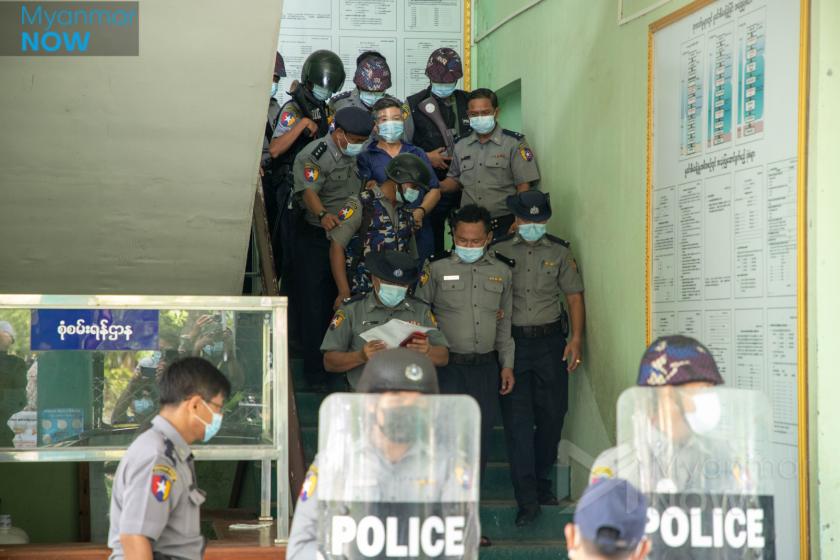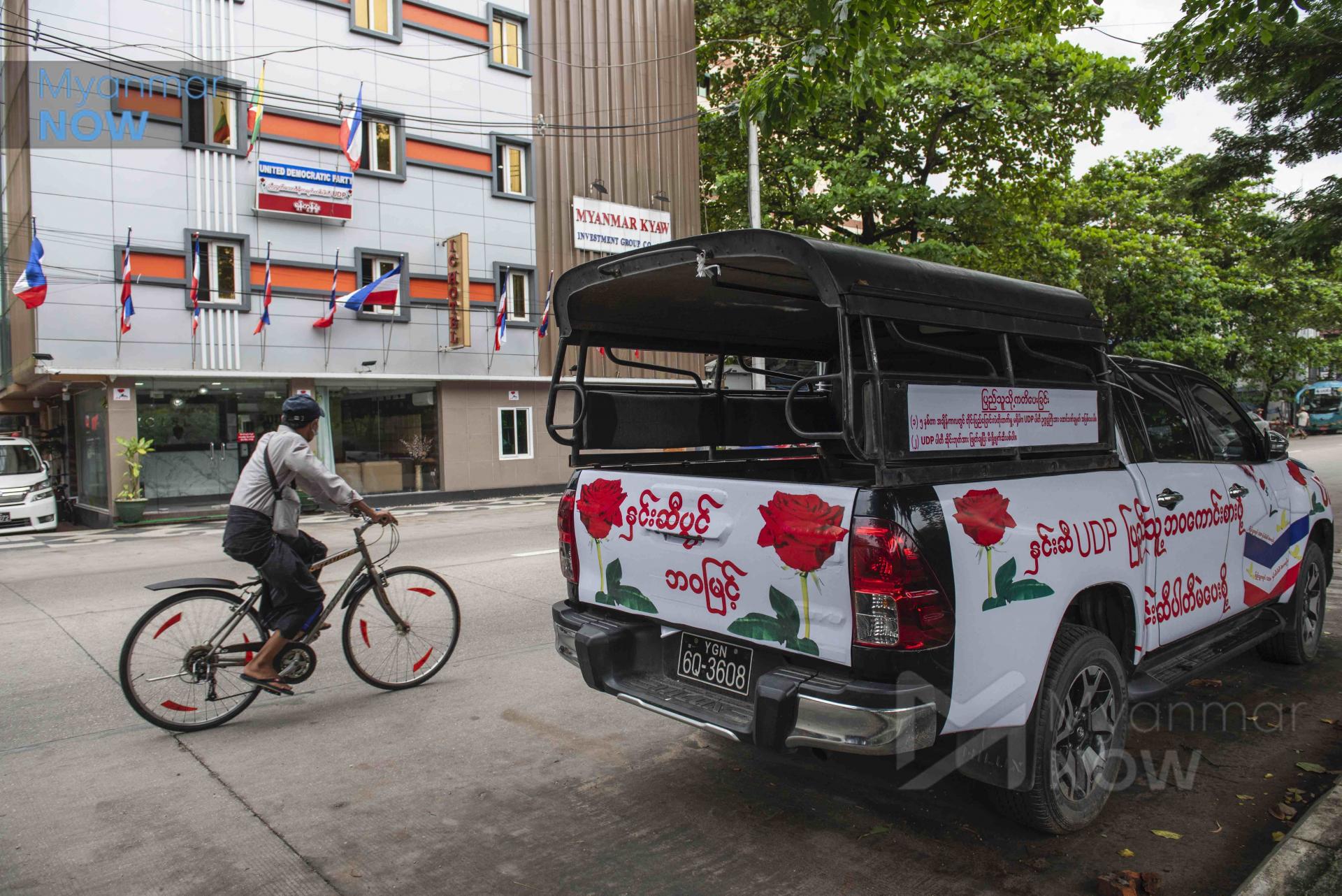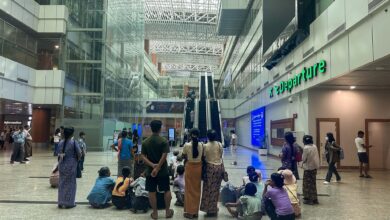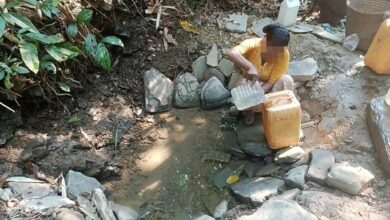
He owns a luxury home in a sprawling gated community in Yangon, is chauffeured around in a Lexus, and hires former military officers to shine his shoes in front of his entourage, a former employee of his said.
Kyaw Myint, the chair of the United Democratic Party (UDP), lives like a king. Or at least he did until police arrested him on Tuesday, putting the brakes on his lavish lifestyle.
Since his return to Myanmar in 2013, he was somehow able to live freely despite the fact he escaped from Mandalay’s Obo prison in 1999, just a year into a nine-year sentence he was serving for flouting business laws.
Authorities said this week he had been arrested as an absconder, which could mean a two-year prison sentence, and hinted that they were investigating other possible offences. He is now being held at Obo prison once again.
Michael Kyaw Myint Hua Hu, as he is also known, was accused in the 1990s of laundering drug money for the United Wa State Army.
After his escape he fled to the US and claimed asylum after co-operating with the country’s Drug Enforcement Agency, he later told a Vancouver Sun reporter.
He then moved to Canada, where he founded the UDP in 2009. Two years later he was fined $1.5m by Canadian authorities for illegal insider trading.
Back in Myanmar, his excesses continued. He travels everywhere with an entourage and drinks Louis XIII, a brand of cognac that costs 4,800,000 kyat, or roughly $3,600, per bottle, his former personal assistant, Zaw Win Htet, said shortly before his arrest.
“He pays 10 to 20 lakhs to former military officers and makes them polish his shoes while people watch,” said Zaw Win Htet, who is himself a retired major and worked for Kyaw Myint from 2016 until 2018.
“Sometimes they have to serve his guests during dinner. If he’s not satisfied, he’ll fire someone the same day he hired them.”
‘It’s not a party, it’s a gang’
But perhaps one of Kyaw Myint’s biggest excesses is the UDP, also known as the Rose Party after its logo. The party has no elected MPs and until recently had little national profile. And yet with the help of his vast fortune it will contest 1,131 seats in almost every constituency in the country.
The only party fielding more candidates this year is the ruling National League for Democracy.
Despite its nationwide reach, UDP representatives told Myanmar Now the party only expects to win around a dozen seats.

Kyaw Myint, who was not running for a seat himself, has also swelled the membership by paying recruiters to find members in townships and village tracts across the country, said Zaw Win Htet.
The Myanmar Kyaw Investment company, owned by Kyaw Myint, spent 5bn kyat, or roughly $3.8m, to support party members working as recruiters across the country, several media outlets reported in 2018.
Zaw Win Htet said Kyaw Myint spent about 100m kyat ($76,000) per month via the company on the UDP, giving 200,000 kyat to township recruiters and 100,000 to village and neighbourhood recruiters.
Kyaw Myint has never signed any documents related to the UDP, despite being its chair and founder. All documents requiring his approval are signed by his 24-year-old secretary on his behalf.
And he often fires staff working for the party for trivial reasons, while many resign because of the “master-servant dynamic” he has established, said Zaw Win Htet.
“It’s not a party, it’s a gang,” he added. “A gang with paid members, like in Chinese films.”
He also claimed to know Chinese business magnate Jack Ma, Zaw Win Htet said. “He told me… that he’s borrowed lots of money from the billionaire Jack Ma. He said Jack Ma was his apprentice, who could provide so many business opportunities.”
‘It’s all talk’
Kyaw Myint was born in Kachin state in 1951 with the name Zakhung Zung Sau. But the exact details of his past are unclear; some of his claims about his background have been refuted by people who were there.
In a blog post in 2009, Kyaw Myint wrote that he joined the outlawed Communist Party of Burma (CPB) when he was 16, in 1967. But he later realised he did not agree with the party’s ideology and in 1988, while working as a strategist for the group’s armed insurgency at base 101 in Mongko, Shan state, he surrendered himself to the Myanmar military.
He was then actively involved in peace negotiations between the military and the United Wa State Army (UWSA), as well as other armed groups, he claimed.
Maung Maung Soe, a political analyst who was working for the CPB at base 101 in 1988, said he was unaware of someone named Kyaw Myint or Zakhung Zung Sau serving there at the same time. ”It’s a lie,” he said.
Nyi Rang, a Lashio-based liaison officer for the UWSA, said: “We’ve asked around about Kyaw Myint since we’ve never heard of him.”
“Anyone at the borders who has ties to the Wa National Party is connected, and they’re associated with politics and businesses. You should ask him for details,” he told Myanmar Now.
Kyaw Myint’s is linked to the CPB via his marriage to Nan Bauk, the daughter of former CPB chief General Zaw Mai. The general, now deceased, was also on the central executive committee of the UWSA.
In a statement released September 20, the UDP claimed Kyaw Myint was from the Lashi tribe in Kachin and was a “leading figure who brought nationwide peace in 1989”.
The claim that he was a leading figure in the peace process appears to be false.
San Pwint, a retired colonel who worked for military intelligence and was involved in peace negotiations in the late 1980s, told Myanmar Now that Kyaw Myint was not there.
“There were no official meetings where he was present,” he said. “The meetings and discussions only included real leaders, there are records of it. There’s a book that details the accounts of everyone involved. He had nothing to do with the process.”
“It’s all talk,” he added.
Kyaw Myint did not respond to Myanmar Now’s requests for an interview.
In a video published on Facebook last month he claimed he was close with the family of Kyaw Zaw, a member of the Thirty Comrades, the group which spearheaded the resistance to British rule. Kyaw Myint’s wife and Kyaw Zaw’s daughter were “like sisters”, he said in the video.
Dr Hla Kyaw Zaw, Kyaw Zaw’s daughter, told Myanmar Now that it was true that her family was close to the family of Kyaw Myint’s wife, but sought to distance herself from Kyaw Myint. “We have nothing to do with him,” she said.
‘Money laundering’
Kyaw Myint’s portrayal of his relationship with the UWSA is at odds with several media reports about a company he owned that was accused of laundering money that the organisation made producing heroin.
Myanmar Kyone Yeom had interests in construction, real estate, mining, timber, tourism, transport and finance, according to an AsiaWeek article published in early 1998.
Kyaw Myint ran the company like the leader of an armed rebel group, the article said.
The article described Kyaw Myint as arrogant and short-tempered, saying he arrived at company headquarters surrounded by bodyguards armed with pistols.

The US State Department in 1998 cited the Kyone Yeom company in a report that said there was “solid evidence indicating that drug profits formed the seed capital for many otherwise legitimate enterprises” in Myanmar.
The same year, Kyaw Myint and a group of retired military officers working at the company were arrested for breaching the Myanmar Company Act. While the government did not specify, it was widely suspected this was related to involvement in money laundering.
Kyaw Myint later claimed his arrest was political, meant as a punishment after he told military officials that power should be transferred to the NLD because it had won the 1990 election.
He escaped from prison after being sent to the Mandalay General Hospital and evaded capture by shaving his head and donning orange robes, said Kyaw Moe, co-founder of the UDP and a party strategist.
“He escaped from the hospital and fled to Thailand as a monk,” he told Myanmar Now.
In Thailand he reportedly went to the American embassy in Bangkok and offered up information on Myanmar’s drug trade to the US Drug Enforcement Agency in exchange for asylum in America with his family.
He later moved to Canada, and in 2007 founded the UDP there.
He also served as chair and director of Maple Leaf Reforestation, a company that sold plants to the Chinese government. Authorities in British Columbia ruled in 2011 that he had bought shares in Maple Leaf while in possession of inside information about a bioenergy project in China.
The British Columbia Securities Commission banned him from trading and fined him $1.5m.
Kyaw Moe, a close confidant of Kyaw Myint, tried to downplay the incident, saying the fine and trading ban was something that companies in Canada were often subjected to. Kyaw Myint currently owns shares in Facebook and Twitter, he added.
Big election promises
Ahead of the 2010 election, Kyaw Myint approached veteran politician and former political prisoner Thu Wai to be the UDP’s chair.
But Thu Wai, who is now chair of the Democratic Party, told Myanmar Now he was soon contacted by shareholders from Kyone Yeom who said they were owed money.
“They said the company owed them, and asked me to ask for the debt. So when I found this all out, I didn’t want to be involved in that mess,” he said.
“Money’s not the most important thing for me. I cut ties with him because I wanted to be involved in politics with a clean conscience,” he added.
The UDP ran candidates in 80 constituencies in the 2010 election and failed to win a single seat. Then in 2013, Kyaw Myint returned to Myanmar. It is unclear how he managed to negotiate his return, or why he was allowed to continue running a political party from inside the country where he was a fugitive.

Not long after his return, he had two meetings with Yang Houlan, the Chinese ambassador to Myanmar. The Xinhua news agency said in a December 2013 report that the two discussed politics and business at length.
In 2015 Kyaw Myint became the UDP’s official chair. He also registered three new companies: Myanmar Kyaw Investment, Myanmar Kyaw Advanced Technology and Myanmar Kyaw Finances.
That year the UDP contested over 40 constituencies in Magwe and Mandalay regions, but as in 2010 it failed to win any seats.
This year, Kyaw Myint’s party is present almost everywhere in the country, and is making some eyebrow raising claims to match its newfound ambition.
Its campaign slogans include: “Each citizen will have at least 36 lakhs as an annual income”; “Each citizen will have 10,000 kyat as a daily wage”; “If we’re granted power, the country will be better than Singapore in five years” and “Every village will be paved with concrete roads”.
Members have also been urged to campaign with the promise that, if the party does not follow through on its pledges after gaining power, Kyaw Myint will be arrested and the party’s sign boards will be burnt down.
The pledge has also been printed on pamphlets, signed by a representative of Kyaw Myint, that are dated September 10.
“Because it’s such an official promise, you can sue him for breaching it if things don’t go well,” said Kyaw Moe, the co-founder and strategist.

The party also claims to have six million members, which would mean more than 10% of the population of the entire country had joined.
“It was very regional before. Now, we’ve set up offices throughout the country. There’s no place that we can’t do it,” UDP Joint Secretary Theik Tun told Myanmar Now.
“Considering there’s at least 100 members in the lowest regional setting, we have about six million members at least,” he said.
On Friday morning the Chan Aye Tharzan court, partly flooded after rain the night before, was heavily guarded by about 30 armed police officers.
Kyaw Myint arrived shortly after midday, his prison van accompanied by four police vehicles. Officers armed with rifles and riot shields led him into the courtroom to be officially charged.
Reporters were not allowed into the courtroom, and as Kyaw Myint emerged surrounded by a column of police officers they were unable to ask him questions.
Then the van carried him back to the same prison he escaped from 20 years ago.



